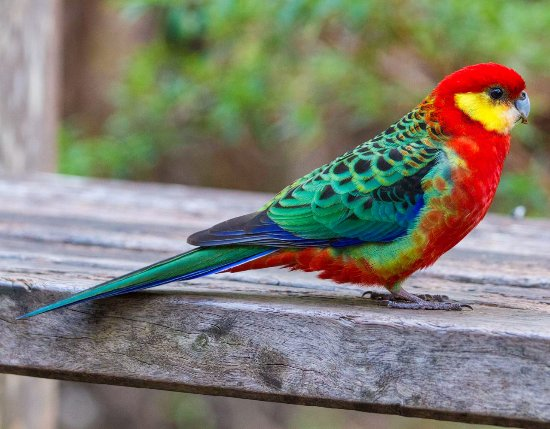Western Rosella

Description
The western rosella (Platycercus icterotis) less commonly known as the Stanley rosella, Earl of Derby's parakeet or Yellow-cheeked parakeet, is the smallest species of rosella and is found in south-western Australia. in Eucalypt forests and timbered areas. These are smallish parrots measuring 25–30 cm (9.8–11.8 in) in length and weighing from 28 to 80 g (0.99 to 2.82 oz), with an average of 63.3 g (2.23 oz). They are red from the head to the breast with white or beige-yellow cheeks and blue and green patterned wings, with males being slightly larger and having a more vibrant yellow cheek colouring. Their bills are a grey 'horn' colour like most Australian parrots.
Western rosellas socialise in pairs but will often congregate in groups of twenty or so to forage when the season permits; their diet is herbivorous, consisting mostly of grass and seeds. They nest mostly in hollow tree trunks usually a meter or so deep and will favour hollows that have dust in the bottom (as may be created by insects boring out the tree or limb). The female incubates the eggs and leaves in the morning and afternoon to eat food found by the male.
Western rosellas make reasonable pets; however, they have a habit of being aggressive if kept with other pets. They are largely sociable with humans and will whistle in return if whistled at.
Scientific Name
Platycerus Icterotis
Country Of Origin
Size
Life Expectancy
Noise Level
Quiet
Talk / Trick Ability
Low
Characteristics
The western rosella is a sociable pet bird that can enjoy whistling back and forth with its owner. Despite its small size, western rosella parrots can be aggressive with other pet birds and it is best to house them separately from other birds. If you keep western rosella parrots in a bird aviary, only one pair per bird aviary. Western rosella parrots are not known for their talking abilty.
Behavior / Health Concerns
Western rosella parrots are generally hardy parrots, but they need structured interaction with their owners to keep them friendly and hand-tame. Tthose who take the time to interact with western rosellas say that they are impish, playful birds that thrive on socialization. They are very active and require a large amount of space to play and fly.
Expert Advice
“Western rosellas can be great pets. They are great as [also] a member of a colony with other birds in an aviary.”
Eva Rosen, EMR Exotic Bird Breeder